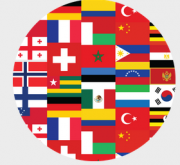 20 July 2016: The UN Department of Economic and Social Affairs (DESA) has issued the zero draft of a policy brief that provides an overview of institutional arrangements for implementing the 2030 Agenda for Sustainable Development at the national level. The authors consider the executive summaries submitted by the 22 UN Member States that participated in the Voluntary National Reviews (VNRs) at the 2016 session of the High-level Political Forum on Sustainable Development (HLPF), and invite feedback from countries and other stakeholders.
20 July 2016: The UN Department of Economic and Social Affairs (DESA) has issued the zero draft of a policy brief that provides an overview of institutional arrangements for implementing the 2030 Agenda for Sustainable Development at the national level. The authors consider the executive summaries submitted by the 22 UN Member States that participated in the Voluntary National Reviews (VNRs) at the 2016 session of the High-level Political Forum on Sustainable Development (HLPF), and invite feedback from countries and other stakeholders.
According to the brief, the summaries of the first 22 VNRs show that across different regions and levels of development, countries are well-engaged in setting in motion the implementation of the 2030 Agenda. It notes that configuring institutional arrangements are among the first steps being undertaken to kick off the implementation of the Sustainable Development Goals (SDGs), and highlights the need to communicate the SDGs within public administration and State institutions, across political parties and within society at large.
The brief includes sections on: institutional arrangements for implementing the SDGs; the engagement of parliaments; public service and public administration; the mobilization of civil society and the private sector; and monitoring and review.
The brief notes that continuous high-level political support facilitates the mobilization and coordination of public institutions and policies. It reports that countries such as Bangladesh, Colombia, Ghana, Mexico, the Philippines and Sierra Leone have created inter-ministerial committees or commissions that are chaired, coordinated or led by the Prime Minister’s or President’s office, while others (Estonia, Ethiopia and Germany) are using or adjusting existing structures. In some cases, including Norway and Uganda, countries are using the leadership of key ministries with cross-cutting influence, such as finance ministries, the authors say.
The brief outlines that Finland, Germany, Switzerland, Colombia and Mexico have taken steps to foster ownership of the SDGs at the local level, and that the UN Committee of Experts on Public Administration recently recommended that local authorities adopt “Local Agendas 2030,” akin to the local agendas 21 that followed the UN Conference on Environment and Development (UNCED) in 1992. It adds that New York City, US, and Seoul, the Republic of South Korea, are among cities that have already signified interest in taking up the 2030 Agenda.
According to the policy brief, implementing the SDGs requires new capacities and new ways of working in public institutions and among public servants so as to identify and analyze inter-linkages, synergies and trade-offs and work across institutional boundaries. The note highlights the need for enhanced capacities to: improve sectoral policies, reach those who are furthest behind, envision the long-term impact of policies, and collect and analyze data and statistics. It also calls on renewed efforts to make institutions transparent and accountable, and to support participatory decision-making
The brief stresses the critical role of parliaments in SDG implementation. Among other examples, it states that the Norwegian Government has decided to integrate and follow up on the SDGs in the annual budget process, and has presented pertinent documents to the parliament for approval. It adds that the Inter-Parliamentary Union (IPU) adopted an Action Plan to launch a comprehensive review of existing national legislative response(s) in each member country to ensure consistency with the Paris Agreement on climate change, the 2030 Agenda and the Sendai Framework for Disaster Risk Reduction (DRR). Consequently, parliaments would put forward any amendment to existing legislation and develop new legislation by the end of 2017, where appropriate, the brief says.
The brief provides examples of countries (Colombia, Egypt, Estonia, Finland, Germany and Venezuela) with existing institutions for multi-stakeholder participation. It also describes experiences where stakeholder participation in SDG implementation is promoted through dedicated discussions, advocacy, consultation activities, and web-based platforms (the Democratic Republic of the Congo, Egypt, Mexico, Montenegro, the Netherlands, Somalia and Tanzania).
Finally, the authors report that many countries have started to reflect on reviewing progress towards the achievement of the SDGs, although the exact modalities are often still being elaborated. For instance, the Ministry of Economy and Planning and the National Institute of Statistics in Madagascar have updated the National Strategy for the Development of Statistics, seeking to provide a monitoring framework for SDG targets. Switzerland uses its sustainable development monitoring system (MONET), which includes 75 regularly updated indicators to measure and report on contributions to the SDGs. The brief suggests that UN Member States should consider the possible engagement of parliaments and supreme audit institutions (SAIs) in reviewing the implementation of the SDGs. It notes that the International Organization of Supreme Audit Institutions (INTOSAI) is reflecting on how best to support SAIs’ role in reviewing SDG implementation.
The brief was prepared by the Division for Public Administration and Development Management (DPADM) and the Division for Sustainable Development (DSD) in DESA. [Policy Brief on Institutional Arrangements (Zero Draft)] [DESA VNRs Online Platform] [IISD RS Story on UN Secretariat Note on VNR Executive Summaries]